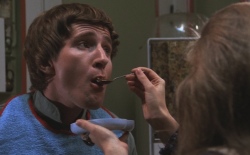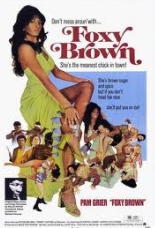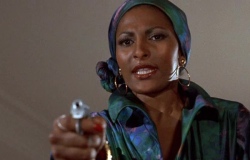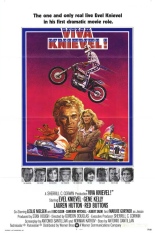
 At the beginning of Viva Knievel!, the world’s most famous daredevil (Evel Knievel, playing himself) breaks into an orphanage in order to deliver a boxful of toys. While he’s there, an adorable crippled moppet abandons his crutches and explains that Evel’s heroism served as the inspiration to get him to walk again. It’s a moment so shameless, it feels like director Gordon Douglas (Them!) is begging us to imagine Santa Claus and Jesus Christ combined in the body of a red-faced, sideburned hillbilly with a twisted motorcycle fetish.
At the beginning of Viva Knievel!, the world’s most famous daredevil (Evel Knievel, playing himself) breaks into an orphanage in order to deliver a boxful of toys. While he’s there, an adorable crippled moppet abandons his crutches and explains that Evel’s heroism served as the inspiration to get him to walk again. It’s a moment so shameless, it feels like director Gordon Douglas (Them!) is begging us to imagine Santa Claus and Jesus Christ combined in the body of a red-faced, sideburned hillbilly with a twisted motorcycle fetish.
And as over-the-top as this may seem, what makes Viva Knievel! so special and an absolute must see for anyone interested in classic WTF cinema is the astonishing fact that this is the most subtle and ambiguous scene in the entire movie!
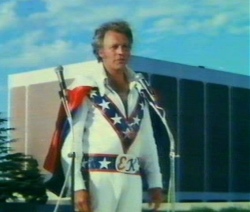 With his life story already having been told in 1971’s Evel Knievel (but starring George Hamilton), Viva eschews typical biopic melodrama in favor of cheesy, ’70s-era action exploitation. That is, unless at one point in Knievel’s life, there really was a conspiracy to sabotage his bike during a jump in Mexico, so a group of drug smugglers could load the semi carrying his corpse back into the States with millions of dollars worth of cocaine. In that case, the film could be considered unusually accurate.
With his life story already having been told in 1971’s Evel Knievel (but starring George Hamilton), Viva eschews typical biopic melodrama in favor of cheesy, ’70s-era action exploitation. That is, unless at one point in Knievel’s life, there really was a conspiracy to sabotage his bike during a jump in Mexico, so a group of drug smugglers could load the semi carrying his corpse back into the States with millions of dollars worth of cocaine. In that case, the film could be considered unusually accurate.
To its credit, Viva is surprisingly well-made and looks like a real movie, unlike similar projects, which tend to resemble glorified TV pilots. To its discredit, it manages to outdo Xanadu for featuring the most embarrassing performance of Gene Kelly’s career and also forces us to confront the terrifying image of Knievel (who is admittedly better in the role than Hamilton was) making out with Lauren Hutton, which ranks right up there with Jessica Alba kissing Danny Trejo in Machete for pure unintended horror. —Allan Mott

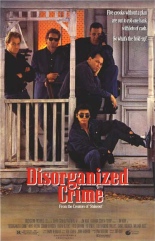

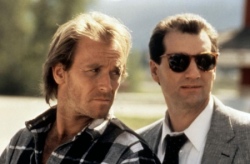
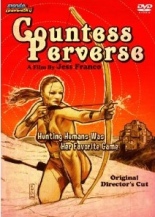
 Stay as a guest at the luxurious, sprawling, Spanish island home of Count and Countess Zaroff (Perverse must be a nickname) and you’ll be afforded the finest, most generous cuts of meat for dinner. The Countess (Alice Arno,
Stay as a guest at the luxurious, sprawling, Spanish island home of Count and Countess Zaroff (Perverse must be a nickname) and you’ll be afforded the finest, most generous cuts of meat for dinner. The Countess (Alice Arno, 
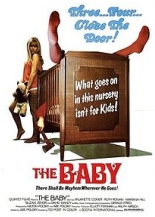
 A planet where apes evolved from men? That strange, sci-fi concept of Ted Post’s
A planet where apes evolved from men? That strange, sci-fi concept of Ted Post’s 